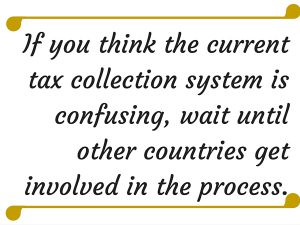The Panama Papers scandal more intriguing than a Grisham novel
April 14, 2016

New evidence of tax evasion is exposing the rich and famous from Canada and around the world.
The Panama Papers scandal has more intrigue than a Grisham novel.
A computer hacker downloaded 11.5 million confidential files from a Panama law firm that specializes in setting up tax havens for wealthy global clients.
Among those named in the leak, 12 are current or former heads of state.
One president is alleged to have $2 billion invested through close associates, and a prime minister resigned when his involvement was disclosed.
China’s news media is being censored. Television and Internet communication are blocked when any news of the Panama Papers is reveled.
The records were obtained from an anonymous source by the German newspaper Süddeutsche Zeitung, which then shared them with the International Consortium of Investigative Journalists.
The amount of information is reported to be 1,500 times larger than the WikiLeaks documents released by Edward Snowden in 2010.
The financial data includes emails and other documents dating back nearly 40 years. Approximately 214,000 shell companies were created for clients in 200 countries.
The Panama law firm has declared its innocence, large banks are being accused of participating, and several countries have announced they plan to investigate possible tax evasion by their citizens.
There is nothing illegal about establishing a shell company. The issue is secrecy, and secrecy means taxes can be avoided without detection.
But detection has happened on an unprecedented scale.
It has been suggested that Canada could be losing billions of tax dollars every year because companies and wealthy individuals have accountants who use loopholes in the system to hide wealth.
Our recent federal budget allocated $500 million to be used to help the Canada Revenue Agency collect taxes that are owed.
The United States has the reputation for being the best tax collector on the planet. They are ruthless at tracking down anyone they think owes them money, and in that regard they often act as a bully.
The U.S. has an arrangement with Canada and many other countries to collect U.S. taxes on their behalf. As a result many Canadians spend time, effort, and money defending themselves against the American tax collection process.
This is the part that is going to affect many Canadians.
Depending on where you were born, or potentially where you lived or worked for a period of time, there might be a reason for a foreign country to claim taxes are owed.
There is an initiative underway for tax authorities in 96 countries, including Canada, to cooperate in global tax collection.
This includes sharing financial information with other jurisdictions.
Other countries want to be more aggressive at collecting taxes. These countries are simply following in the footsteps of how Americans have been successful in collecting more tax revenue.
There are several implications for Canadians. If you think the current tax collection system is confusing, wait until other countries get involved in the process.
Many taxpayers who struggle with current Canadian tax laws will be overwhelmed when one or more other countries attempt to collect taxes.
The demand for qualified tax accountants is going to increase. The accountants themselves will have to increase their qualifications and understanding of a more complex system.
The cost of filing a more complicated income tax return will escalate.
An even more significant cost will be if two countries are claiming you owe them taxes, because you will have to sort out the mess of who legitimately should receive tax revenue.
The monumental and embarrassing exposure of tax avoidance created by one law firm in Panama has added fuel to the fire.
Countries are aware they are being ripped off and will make adjustments to ensure they are more efficient at collecting taxes.
For some, the process of paying income tax is going to get complicated.
